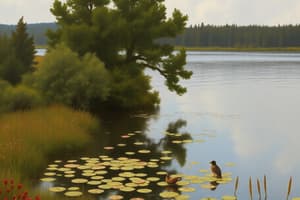Podcast
Questions and Answers
Which of the following is NOT considered a geological resource?
Which of the following is NOT considered a geological resource?
- Gold
- Copper
- Timber (correct)
- Iron
Which type of natural resource encompasses solar and wind energy?
Which type of natural resource encompasses solar and wind energy?
- Agricultural resources
- Wildlife resources
- Forest resources
- Energy resources (correct)
How do minerals and metals from natural resources contribute to our lives?
How do minerals and metals from natural resources contribute to our lives?
- By enhancing infrastructure like buildings and highways (correct)
- By generating electricity
- By supporting food production
- By providing timber for construction
Why are agricultural resources crucial for agrarian societies?
Why are agricultural resources crucial for agrarian societies?
Which of the following is NOT an example of wildlife resources?
Which of the following is NOT an example of wildlife resources?
What type of energy resources are derived from natural phenomena?
What type of energy resources are derived from natural phenomena?
What is one of the challenges mentioned in the text related to natural resources?
What is one of the challenges mentioned in the text related to natural resources?
Which statement best describes the impact of resource extraction on the environment?
Which statement best describes the impact of resource extraction on the environment?
What is a strategy mentioned in the text to achieve a sustainable future related to natural resources?
What is a strategy mentioned in the text to achieve a sustainable future related to natural resources?
What can result from competition for natural resources, according to the text?
What can result from competition for natural resources, according to the text?
Which of the following is NOT mentioned as a factor contributing to economic inequality related to natural resources?
Which of the following is NOT mentioned as a factor contributing to economic inequality related to natural resources?
What aspect of natural resources is a focus of responsible resource management strategies according to the text?
What aspect of natural resources is a focus of responsible resource management strategies according to the text?
Flashcards are hidden until you start studying
Study Notes
Discovering the Abundance of Resources
Resources refer to the various materials, energy sources, and capabilities that we use to satisfy our needs, enrich our lives, and fuel societal progress. This exploration will delve into natural resources, a vital aspect of our relationship with the world around us.
The Diversity of Natural Resources
Natural resources encompass a broad range of materials that originate from the environment, such as:
- Geological resources: These include minerals, fossil fuels, and metals like gold, copper, and iron.
- Agricultural resources: Comprising crops, livestock, and water used for farming and food production.
- Forest resources: Encompassing timber, biofuels, and other products derived from forests, like medicinal plants.
- Wildlife resources: Including fish, game, and other living organisms that we harvest or utilize for livelihoods and recreation.
- Energy resources: Such as solar, wind, hydropower, and nuclear energy, which are derived from natural phenomena or processes.
How Natural Resources Shape Our World
Natural resources serve as the foundation upon which our civilization is built. They are essential to our daily existence, influencing nearly every aspect of our lives:
- Food: Agrarian societies rely on natural resources, like soil, water, and sunlight, for crops and animal husbandry.
- Infrastructure: Minerals and metals from natural resources support the construction of buildings, bridges, and highways.
- Energy: Natural resources provide the fuel, like coal, oil, and natural gas, for heating, electricity, and transportation.
- Medicines: Pharmaceuticals and medical instruments often utilize natural resources, such as plants, minerals, and animal products.
- Recreation: Outdoor activities, like camping, hiking, and fishing, rely on natural resources like forests, streams, and lakes.
Current Resource Challenges
Despite their abundance, natural resources are not limitless. As global populations grow and demand for resources intensifies, several challenges emerge:
- Resource depletion: Overexploitation and non-sustainable practices, like strip mining or deforestation, can lead to resource depletion and loss of ecosystems.
- Environmental impact: The extraction, production, and consumption of natural resources can have detrimental effects on air, water, and land, leading to pollution, habitat destruction, and climate change.
- Economic disparity: Access to and control over natural resources can lead to economic inequality, as some regions rely on resource extraction for their livelihoods, while others experience job loss and environmental damage.
- Conflict: Competition for natural resources can lead to conflicts and tensions between countries and within communities, as resources like oil, water, and timber become scarce.
Strategies for a Sustainable Future
Achieving a sustainable future demands a shift towards responsible resource management. Some strategies to address resource challenges include:
- Sustainable extraction: Implementing practices that minimize resource depletion and reduce environmental impacts, such as reforestation efforts, responsible mining practices, and water conservation initiatives.
- Efficient use: Encouraging the development of technologies and processes that reduce resource consumption, such as renewable energy, recycling, and circular economies.
- Resource recycling: Implementing programs to promote the recycling of materials and the reuse of resources, like waste reduction and composting efforts.
- Resource equity: Ensuring that the benefits of natural resources are distributed fairly and equitably, supporting sustainable livelihoods and economic growth across all regions.
- Conflict resolution: Encouraging dialogue and cooperation between countries and communities to resolve conflicts over natural resources, fostering peace and stability.
In conclusion, natural resources play a vital role in shaping our world, providing the materials, energy, and capabilities we need to thrive. However, it is essential that we manage these resources responsibly and sustainably, ensuring that future generations can enjoy the benefits of a plentiful and healthy world.
Studying That Suits You
Use AI to generate personalized quizzes and flashcards to suit your learning preferences.




